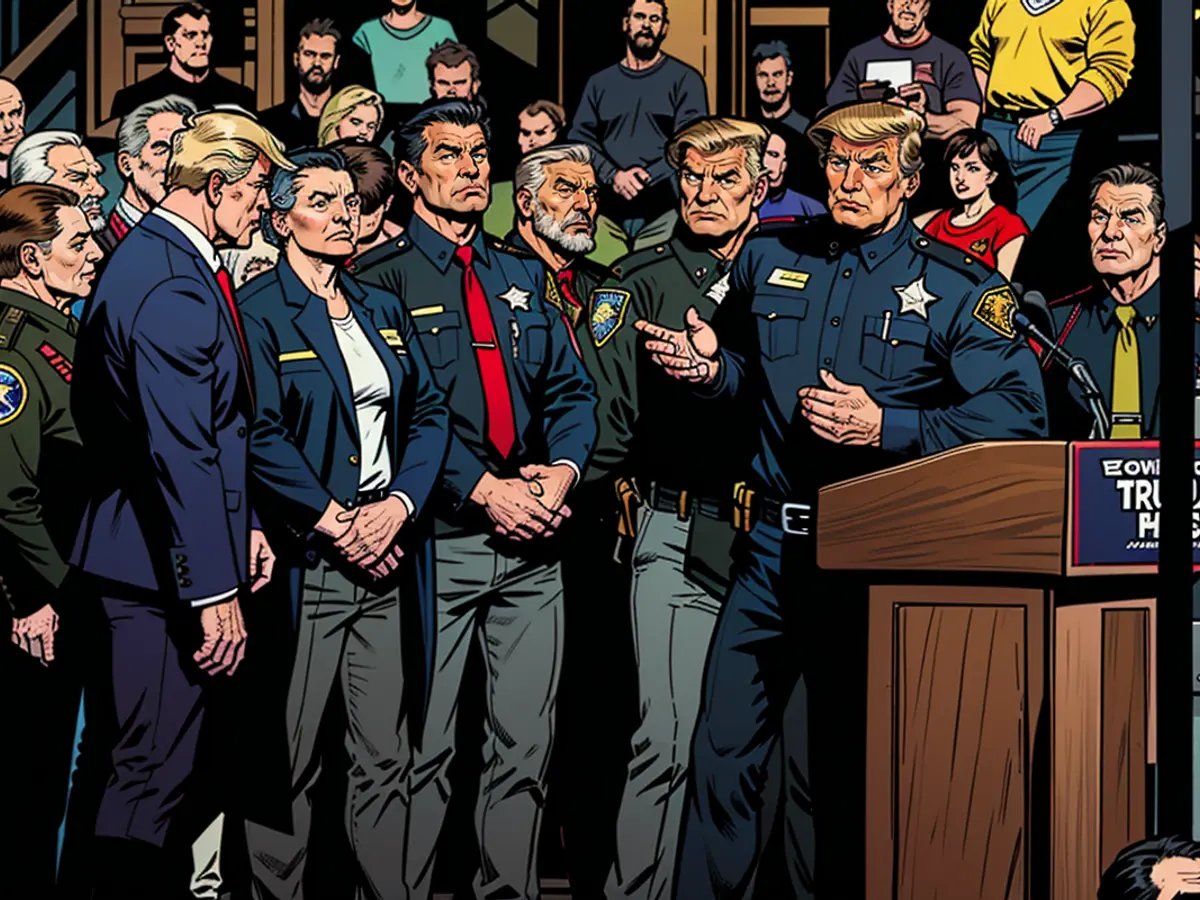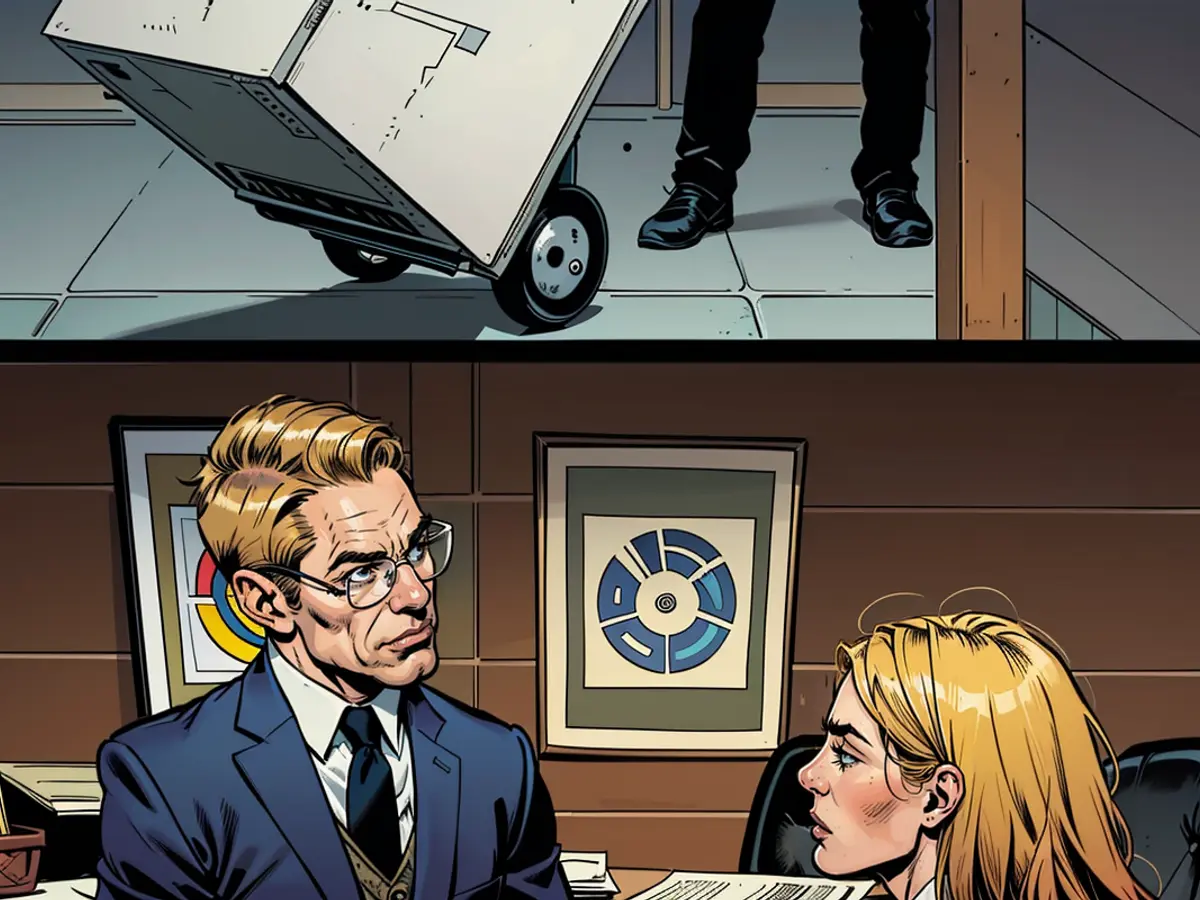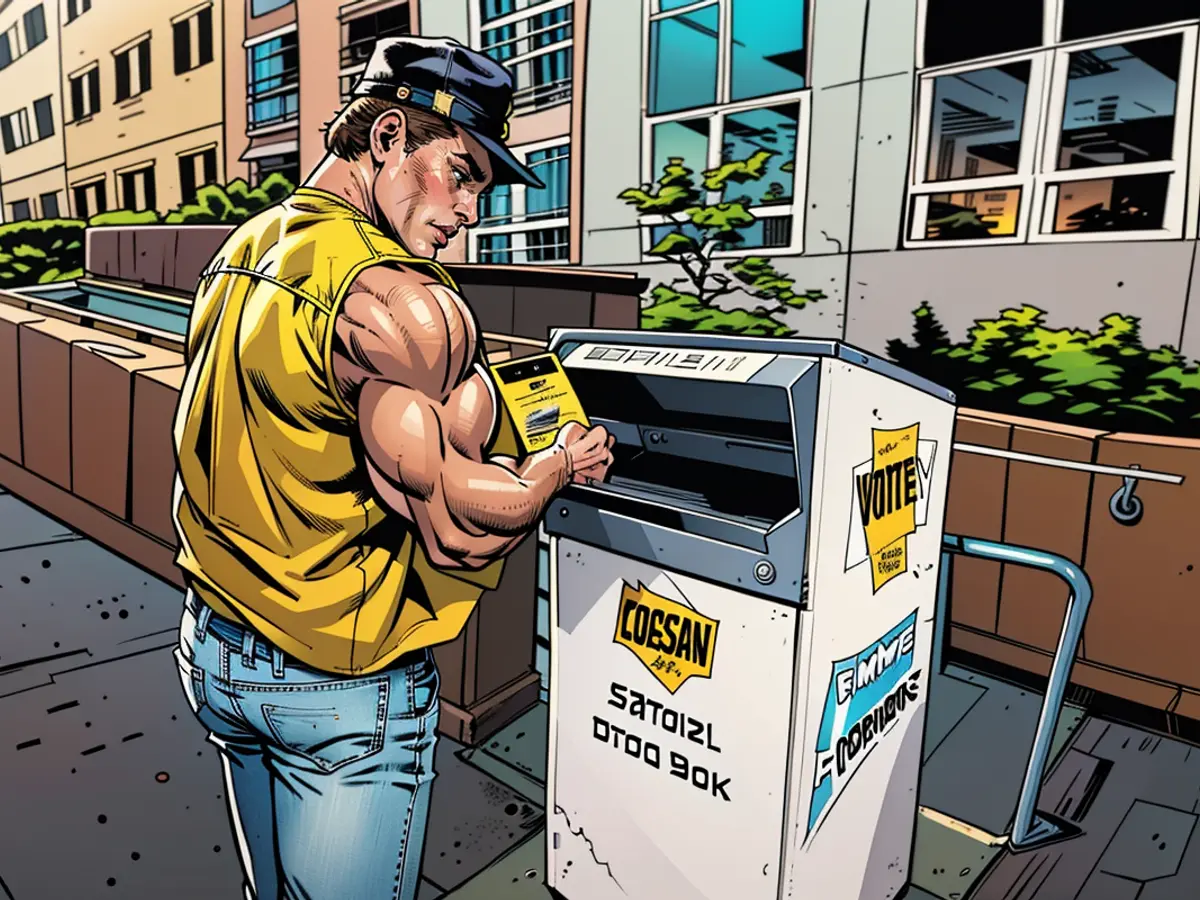"Neighborhood Tensions Arise Over": Ballot Drop Boxes Cause Frustration in Wisconsin
"I've got some significant info you might find interesting," Sheriff Dale Schmidt shared with Trump. "In Dodge County, for the 2024 election, there are no drop boxes available for voting."
That wasn't exactly accurate – the crowd applauded loudly, with Trump offering Schmidt a thumbs-up in return.
Drop boxes have become a contentious topic in Wisconsin, a battleground state during elections, and a tool that increased the ease and security of absentee voting during the pandemic-era 2020 election.
In the state's two largest liberal cities, drop boxes are widely accessible, with more than a dozen locations to drop off ballots, such as fire stations and libraries. However, not all cities and towns share this accessibility, as local leaders have rejected them in some areas.
The controversy surrounding these drop boxes has seen a dramatic shift in the legal landscape from election to election. While they were legal in Wisconsin in 2020, they were mostly banned in 2022, and now, after liberal control of the state Supreme Court, they are once again legal.
According to figures from the Wisconsin Elections Commission, at least 78 drop boxes are currently in use across the state during the general election, although this is likely an undercount as local clerks are not required to disclose drop box locations to the state commission. However, this is significantly fewer than the 528 drop boxes the commission was aware of in 2020.
The question of whether to use them largely falls on over 1,800 local officials who oversee the state's elections. Cities such as Milwaukee and Madison will each use 14 drop boxes, while other cities and towns will use one or several.
The Wisconsin Democracy Campaign, a voting rights group pushing for more drop boxes, has voiced concerns over the number of municipalities choosing not to use them this election. Nick Ramos, the group's executive director, referred to a perceived attempt to intimidate and discourage local clerks from implementing drop boxes.
Wisconsin is widely regarded as one of the closest swing states in this year's presidential race, four years after President Joe Biden won the state by less than 1 percentage point.
Explosion in Wausau
The most heated debate over drop boxes this election season has centered around Wausau, a city with around 40,000 residents that resides in a conservative county.
Last month, Wausau Mayor Doug Diny, a Republican, wore a white hard hat and high-visibility gloves as he removed the city's ballot drop box to his office. The box was locked and not in use at the time.
Diny documented the incident by sending photos of himself relocating the box to the city clerk and other local officials. However, under a state Supreme Court decision this summer, decisions about drop boxes were placed in the hands of local clerks, not mayors, and his actions received widespread attention.
Now, the Wausau drop box has been restored to its original location in front of City Hall, where it is locked at all times and emptied daily by local officials. Meanwhile, the city clerk has passed the controversy on to the county prosecutor, and the state Department of Justice is investigating Diny's actions.
In an interview with CNN, Diny argued that he was not breaking any laws and had moved the drop box due to security concerns at the time.
"For all I know, someone could have snatched it up, tossed it in the river," Diny explained. "Now, we would have a real crime on our hands."
Asked if he regretted the move, Diny replied, "There's an old saying that 'dogs don't bark at parked cars.' I've had to stir things up here and then to challenge the status quo."
However, voting rights advocates condemned Diny's actions.
"No one person gets to impose their will and interfere in someone else's right to vote," said Jeff Mandell, general counsel for Law Forward, a public interest law firm in the state that has worked on voting rights cases. "If he finds the drop box to be problematic, then, of course, he is welcome, like anyone else, to express his opinion. But he can't unilaterally restrict others' rights to lawfully cast their ballots."
At a heated City Council meeting last week, supporters and detractors of Diny filled the council chambers. One voter criticized the "deep state at work in little Wausau," while another felt embarrassed for the city. Diny proposed spending $3,000 on additional security for the drop box, but the council did not vote on his proposal.
Outside City Hall, police officers stood by to maintain order between protesters supporting the drop box and those opposing it.
"We are tired of politicians using conspiracy theories, no matter which party you favor," said Nancy Stenzel, a Wausau resident, to disapproval from opponents. "Drop boxes are secure and reliable."
"The letter strongly endorsed voters utilizing any of these legitimate, reliable, and legally authorized methods for returning absentee ballots via mail or drop boxes."

However, following Trump's defeat, Republican leaders altered their stance. In December 2020, when the Wisconsin Supreme Court denied Trump's attempt to reverse the 2020 results, three of the court's conservative justices hinted that drop boxes may not be in accordance with state law.
Trump emphasized Wisconsin's drop box policies in his January 6, 2021 speech before the Capitol riot, falsely claiming that drop boxes in the state mysteriously went missing for days.
A conservative group initiated a lawsuit to eliminate drop boxes in Wisconsin, and in 2022, the state Supreme Court's conservative majority accepted this petition, restricting drop boxes only to those located within clerks' offices. This decision, praised by GOP leaders like Vos, was enforced for that year's election.
In 2023, liberal Judge Janet Protasiewicz secured a position on the state's high court, bringing the 4-3 conservative majority to a 4-3 liberal majority. Prior to her joining the court, the Democratic organization Priorities USA filed a lawsuit challenging the 2022 drop box decision.
By July, the court revoked the 2022 ruling, with the liberal justices arguing it was incorrectly prepared. Wisconsin's more than 1,800 municipal clerks were granted the freedom to decide whether or not to use drop boxes during the upcoming general election.
Currently, Wisconsin voters are grappling with a selection of fluctuating local drop box policies. Cities, such as Kenosha, the state's fourth-largest, have chosen not to utilize drop boxes for this election. In contrast, other parts of the state maintain the same drop box locations they used four years prior. Milwaukee, the state capital and a Democratic stronghold, positioned most drop boxes in front of libraries, while Madison officials chose to station the majority of their drop boxes near fire stations.
Dylan Brogan, a spokesperson for the Madison city government, asserted, "The city drop boxes are always under continuous surveillance, and the fire stations are perfectly suited to host the drop boxes because they're staffed 24/7 and dispersed throughout the city."
Conservative opposition to drop boxes
Wausau isn't the only location in Wisconsin experiencing conservative political leaders' attempts to abolish drop boxes in 2022.
In Dodge County, the heavily pro-Trump county of around 90,000 residents, the elected sheriff urged clerks not to employ drop boxes. In an August email to three county clerks acquired by WisPolitics, Schmidt suggested that utilizing drop boxes would undermine trust in the system.
When Schmidt informed the clerk in one town that her municipality would be the sole one in the county to use a drop box, she responded within 15 minutes, disclosing her choice to close the box, as reported by WisPolitics.
Earlier this month, Schmidt celebrated his achievement at a Trump rally in Juneau, Wisconsin, where the former president bestowed him with a double thumbs-up. Schmidt admitted that Trump contacted him to join him on stage.
Schmidt expressed his viewpoint, "If we encounter an area of the law that is repeatedly being circumvented, we will devise methods to place obstacles in the path of individuals aiming to break the law."
When confronted with a lack of evidence demonstrating drop boxes violating any rule, Schmidt stated, "There is an impression that such an occurrence may be taking place, and we are ensuring that it will not materialize."
Surveillance of drop boxes
Republican Senate candidate Eric Hovde has also raised doubts regarding drop boxes.
"We must guarantee that there's someone keeping a watchful eye over the drop box around the clock, for about 45 days, to prevent unscrupulous individuals from dumping fake ballots," Hovde informed his supporters in July, according to The Washington Post.
Some conservative activists have announced their intentions to track drop boxes 24/7. The conservative group True the Vote, which promotes conspiracy theories regarding voter fraud, dispatched its employees across Wisconsin to gather "specific drop box locations" in preparation for establishing video livestreams of the boxes, as revealed by True the Vote's director, Catherine Engelbrecht, in an email to supporters.
"True the Vote is providing camera equipment, hotspots, and streaming support," Engelbrecht wrote. "We have also contacted states, counties, cities, and other municipalities, requesting video footage of the ballot dropboxes, from the time they are opened until they are closed on Election Day. Unlike what transpired in 2020, we are now significantly better prepared in this regard."
An activist with the group highlighted True the Vote's efforts as establishing "a dropbox surveillance reality show" in a Truth Social post, which was subsequently deleted, according to WIRED.
Mandell, of Law Forward, expressed worry about voter intimidation.
"Of course, people have the right to observe the drop-off of absentee ballots. However, it's crucial to recognize and respect the tenuous line that exists between observation and intimidation."

Despite the lack of drop boxes in Dodge County for the 2024 election, the Wisconsin Elections Commission reported 78 drop boxes currently in use across the state, a significant decrease from the 528 drop boxes in 2020.
The controversy over drop boxes in Wisconsin has seen a dramatic shift in the legal landscape, with their use becoming legal once again after liberal control of the state Supreme Court. However, some political leaders, like Sheriff Dale Schmidt, have expressed concerns about their use and urged clerks not to employ them.








